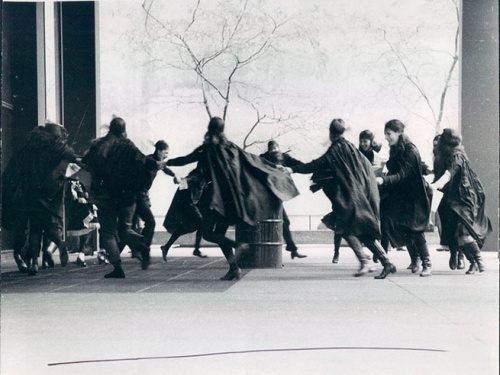Now You Can Go: On Feminist Generations, Affective Withdrawal and Social Reproduction
To coincide with our Now You Can Go event series, a programme considering feminist thinking, art and activism, Dimitra Gkitsa has written this piece exploring the history of Italian feminism and how its legacy can inform activism in the present.
In 1970s Italy, women developed collectives that were characterized by a new-found determination to gain full autonomy of expression. Carla Lonzi, Carla Accardi and Serena Castaldi formed Rivolta Femminile (Female Revolt) [PDF], a radical group that created space for women to question not only their interactions with the world, but most importantly to raise awareness of the self. Many similar feminist groups were formed at that time such as Libreria delle Donne di Milano (Milan Women’s Bookstore), Lotta Femminista (Feminist Struggle) and Anabasi. They proposed alternatives to patriarchy’s oppression of women in all its social relations, including within left political parties, trade unions and social movements. Carla Lonzi in Let’s Spit on Hegel (1970) [PDF] writes:
“Woman’s difference is her millennial absence from history. Let us profit from this difference; for once we have achieved inclusion in society, who is to say how many more centuries will have to pass before we can throw off this new yoke? The task of subverting the order of the patriarchal structure cannot be left to others. Equality is what is offered as legal rights to colonized people. And what is imposed to them as culture. It is the principle through which those with hegemonic power continue to control those without” [Translated by Veronica Newman].
While these autonomous feminist collectives raised issues of domestic labour and alternative models of collective care, campaigning for a salary for housework, they also explored the different roles of women in sexual relationships. The tactic of self-awareness (autocoscienza) became key and led to a self-determined and self-directed element of social and class struggle. Αutocoscienza was the feminist practice that aimed to reclaim women’s relationships by beginning first and foremost with the self, while also engaging with the complex differences that exist among women. The process of creating collectives became a way to question anew both the construction of the self as an individual subject and the collective meaning of performing common women’s experiences in the public sphere.
Αutocoscienza presupposes both an abundance of the self and an intimate acceptance of the other through a collaborative force: it is a feminist tactic of practicing trust. The collaborative gatherings initiated via autocoscienza indicated relationships in which a woman entrusted herself to another woman (affidamento) by narrating her personal stories and private experiences. Through the stories that women were confessing and revealing to one another, they were also articulating “their own existence and personal identity” (Cavarero, Relating Narratives, 2000). In this practice of self-awareness and consciousness-raising, the desire to express oneself, when shared with others and their experiences, is transformed into a political act that demands space outside the realms of the private and urges sociocultural change. Collectives thus created a political space, and at the same time a zone of trust that was finally able to host and give voice to women’s narratives and experiences.
To better understand the practice of consciousness-raising and how it was inseparable from the private and public, everyday life and theory, personal experience and intimate narration, it is worth considering the life of Carla Lonzi as a pioneer of the Italian feminist movement and an art critic. Lonzi distanced herself from academic protocols and maintained a continuous dialogue with established artists of the 1960s. Her texts and conversations with artists provided the materials for her 1969 book Autoritratto (Self-Portrait) which reflects her struggle to redefine and support her female subjectivity within the male-dominated art world of the time. On the other hand, in Vai Pure (Now You Can Go), 1980, Lonzi focuses on her romantic relationship with the artist Pietro Consagra to describe the clash of two different worlds: man’s life, which was connected with social productivity, and the woman’s silenced experiences. The withdrawal from her relationship with Consagra and the rejection of her role as an art critic became the means for liberation and a way to reclaim her subjectivity.
Could such tactics of consciousness-raising be practiced nowadays as an alternative to the exhaustion and anxiety that we experience under networked capitalism? Can forms of working together offer new platforms for redefining subjectivity and social labour? In addition, could intimate methodological tools, inherited from feminist practices, lead to new forms of artistic production and creativity and at the same time reveal acts of omission in the art world? These are the questions posed by the Now You Can Go programme.
Italian feminist thinking can become a stepping stone for reconsidering subjectivity today. It can enable us to create conscious potentialities by redefining the self in relation to others, in order to transform current modes of labour and social reproduction. More importantly, the conscious awakening engendered by their collective practices has the potential to create “bodies in alliance” which Judith Butler argues develop shared experience and maintain spaces of resistance. As Adriana Cavarero writes, “the we is always positive, the plural you is a possible ally, the they has the face of an antagonist, the I is unseemly, and the you, is of course, superfluous” (Relating Narratives, 2000). ■
Now You Can Go: Rescue Missions: Women’s Art Recovered takes place on 9 December. Download the full event programme below.
Further events exploring feminism today take place throughout December, including exhibition and panel discussion Feminist Practices in Dialogue and a symposium on women's filmmaking in contemporary Britain.
This article is posted in: Articles, Blog, Events
Tagged with: Now You Can Go, Feminism, Italy, Italian Feminism, Carla Lonzi, events, Exhibitions, Affective Labour, Affect, Women's Collectives, Art, Artists








